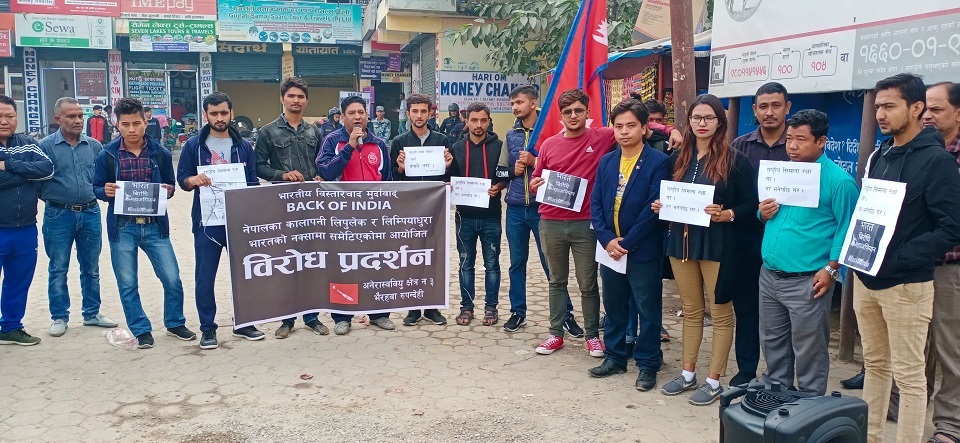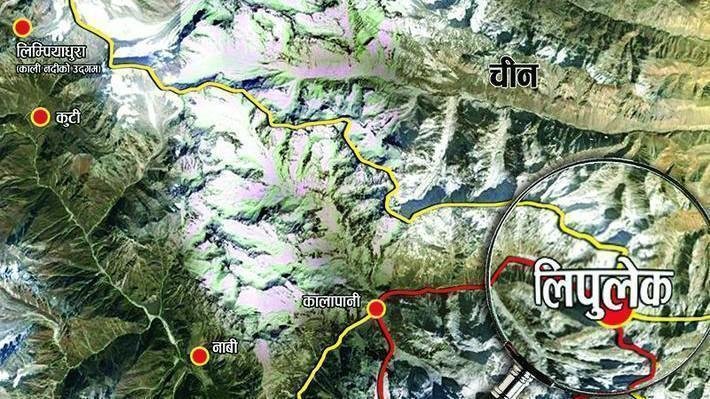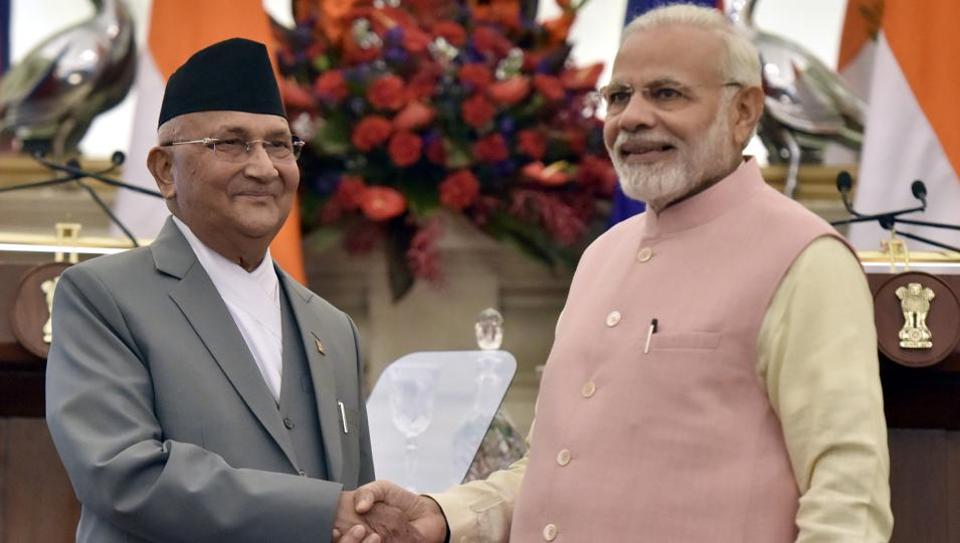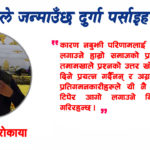Lie and Deception in Politics: How Kalapani Fell Pray
-Durga “Deep” Kunwar
I was dabbling with an interesting book, Why Leaders Lie, by a famous international relation professor John Mearsheimer, precisely when the border dispute of Kalapani emerged with the release of controversial political map of Indian Union upon change of the status of Jammu and Kashmir from a statehood into two separate Union Territories (UT), following a much-hyped abrogation of article 370 of Indian constitution.India must have paid due diligence plotting fresh face of her new dominion but in doing so doggedly undermined Nepal’s sovereignty. As majority of Indian establishment were rejoicing savvy new projection of Modi’s craft manship, Kashmir was preparing to challenge the move and more so were the people of Nepal over Kalapani. The winter breeze of-November 2019 inevitably caught both the sides into heated debate with an offensive symbiosis, trading slew of statements, one after another.
Interestingly, the issue that dragged both the neighbors into a precarious situation was certainly not an isolated impasse. The standoff sprouted with the permanent station of Indian paramilitary, ITBP, without Nepal’s permission but compounded with recent unilateral claims over Nepal’s territory into its jurisdiction. The new map of Indian dominion is a major setback to Nepal’s effort to resolve border dispute peacefully.However, keeping Indian aggression aside, the issue also serves a poor report card for Nepalese political leaders in handling the Kalapani dispute. There are many instances where they not only involved in “disinformation laundering” but also under performed miserably in handling sovereign issue. For instance, the recent rhetoric maintained by Nepal that no boundary dispute whatsoever with India is remained to be addressed, bypassing historical documents and realities on the ground,says much about Nepal’s debacle.
After much damage being done, Kathmandu, under tremendous duress, came out with a communique undersigned by an anonymous official, triggering massive out pour in social media and furor on the street.The territory of Kalapaniwas too strategic for India to relinquish at any point of time and ironically,it remained far too invisible for Kathmandu to comprehend and contest.Over the years, with vested interests, both sides maintained mysterious stand. In border management meetings, including the most recent one held in Pokhara, India always preferred to defer the Kalapani issue.
After all, sitting on strategic spur, why would India give up Kalapani when troops were comfortably stationed on a geo – political grid with a firm foot on the ground. In light of continual Nepalese political demurral with lack of Nepalese security forces to hardened its border and no diplomatic and security deterrence, more or less we open invited toIndia’s trample.
In fact, for many decades, no security agencies from Nepal were to be seen on the ground anywhere near Kalapani. Neither are they today. In hindsight, Indian forces clashed with Chinese PLA in 1962 and as a forward base, since then, raised and maintained a permanent Indian post to be stationed there. However,the land was grabbed way before, presumably in1850’s, against the spirit of Sugauli Treaty of December 2, 1815. Having historical facts and favorable realities on hand, Nepal however,continuously preferred to abandon Kalapani. Instead, Nepal engaged in narrating myth and telling “noble lies” to its people.
The continuous political lie and fiasco of Nepal compounded with diplomatic failure to address Kalapani issue on time is what costing her dearly now. The deployment documents forwarded by Armed Police Force (APF) for the government approval, gathered more Dustin the ministry alley than troop covered distance on the ground. Perfidious political conduct and consistent diplomatic dodging carried the Kalapani standoff far too long to this very unpleasant situation where both parties are running out of policy alternatives to resolve it amicably. The recent claim made by the chief minister of Uttarakhand is testimony to that and now China coming into play, the tree-junction strip of Kalapani is well trapped into dirty entanglements of power politics, sure to spin out of bilateral rim.
Contradiction to historical facts and ethnographical documents, India may have laid their narratives to claim the disputed territory but they know degree of comfort Kathmandu enjoys with little or no margin of errors should a fact-finding mission is warranted. After all, subjugation of Kalapani is a result of proxy aggression and therefore against the UN Charter. However, Nepal instead of employing such strong credentials always remained on back foot and used Kalapani card for petty politician for political vendetta. Once in the government, Kalapani was always case forgotten.With such a dichotomous political conduct of Nepal, India kept on expanding their influence by displacing Nepalese domicile and Nepal continued to pursue liberal lies and cover-ups.
Doubling down on my the making and misleading its own people with lies and lures, Kalapani is now well in cradle of India dominance, as an occupied territory.Nepal’s political parties failed to address Kalapani issue having such a favorable credential, particularly when approx. 355 sq./km area is under constant occupation since 1961. Principally, the narratives continuously adopted by Pseudo nationalist in Nepal paraphrasing myth and lies coated with deception and cover-ups are perfectly understandable in political theater. However, practically playing with such cards on sovereign issue with utter lack of political morality and will to is incomprehensible to decipher.
 How Lie cost Kalapani to Nepal
How Lie cost Kalapani to Nepal
There are numerous historical instances where credible leaders and seasoned statesmen have resorted to tell lies either to gain political advantage or to address critical situations. Senator John Kerry, the US senator from the democratic party, called President Bush a liar during 2004 election campaign and said he “failed to tell the truth” about Iraq and “mislead the American people.” However, he knew telling such lies to frame policy and profess political agenda is absolutely an acceptable conduct in international politics. Military engagement of the USA in World War II was also based on such narrative when Franklin D. Roosevelt in 1941 lied about a naval incident to draw the United States into the war. The identical legacy was pursued by President Lyndon B. Johnson, who lied about a chain of events in Gulf of Tonkin in 1964 to win the congressional support to wage a war against North Korea.
Therefore, framing in politics is a preferred tool most employed by political leadership to orient themselves in a considerable way that shapes their political intentions. However, such lies are troublesome when it is orchestrated for personal gain. After the 9/11 terrorist attack, the Bush administration coined and framed “War on Terror”, something that American folks were not accustomed to. As American public got confused with the new theme, the political sphere too confronted a dilemma as how to deal with such an unprecedented security situation.
As time was running out and pressure mounting, home and abroad, Secretary of State, Collin Powel, advised to consider the terror attack of 9/11 as “international police situation” and therefore bringing the issue to International Criminal Court (ICC), indicting Osama Bin Laden combined with forging an international coalition, devolving vigorously on diplomacy to build allies and if needed “use” military strength for “law enforcement” purpose. But, President Bush had different intentions. He repeatedly framed “War on Terror” to the center of his speeches and never hesitated to use the metaphor “will dig out of the hole” to locate and eliminate Al-Qaida and their operatives.
Bush administration’s constant rhetoric on “War on Terror” as counter-insurgency strategy became an indispensable part of 9/11 military campaign. But the phrase “War on Terror” itself was misleading. “War” implies the necessity of legitimate military action and when “terror” is added to “war”, a metaphor is created in which “terror” becomes a “belligerent”. In any war, the single most objective of any military is to defeat adversaries. It’s a zero-sum game.
But the US framing of “War on Terror” was to be facing wider risks and wicked challenges, much beyond military assured solutions for apart from achieving military objective- find and finish Al Qaida- they were also trying to eliminate “terror”, a state of mind or a psychological enemy. Nevertheless, for Bush administration, the theme “War on Terror” was an important move not only to rally American public to support US engagement on global war on terror but also to thwart and deter such attacks on the US soil by pursuing enemies into their own territories and hideouts.
It was a patriotic move too. The plan worked and political objective was met with a perfect framing of the seemingly complex issue. Also, in 1991 when coalition forces along with the US military entered into war against Iraq, the administration falsely claimed that they have hard evidence against Saddam Hussein in possession of weapons of mass destruction (WMD). They also claimed that administration is open to a peaceful resolution with Saddam regime, when in fact the decision to go to war had already been made. Therefore, obvious hiding of facts and shadowing truth coupled with crafty lies and spinning have been some of the best tools for many politicians,particularly in critical situations.
This craft is something every seasoned envoy or diplomat tinkers with every day. In handlingforeign policy matters, Sir Henry Wotton, a 17th-century British diplomat, coined that an ambassador is” an honest man sent to lie abroad for the good of his country.” Therefore, what George W. Bush and Tony Blair did during the Iraq invasion war part of their job crafted with high judgmental value. However, it is important to understand that such lies in international politics are not entertained for narrow personal gain but for the larger national interest.
Leaders usually frame their narratives on lies for good strategic reasons and such frames are absolutely acceptable unless it is not intended to crisscross self-interest. Lying is however not the greatest tool to employ but it is definable useful craft of a statesmanship to rely on at trying times. However, such lies turn dangerous when leaders purposely blind their own people with parochial facts. In the event of Kalapani, this is where Nepal miserably failed. After all, the annexation of Kalapani into the jurisdiction of India was not a sudden geopolitical move that took Nepal by surprise but was a steady proxy aggression that should have been intercepted and dealt in timely manner employing range of soft skills.
The deliberate spinning by almost all political parties who came to the helm of power revolved their narratives on constant lying and deviating people with misleading facts. Encroachment of Kalapani was not an sudden Indian misadventure nor it was a deceptive surprise perpetrated by Indian military complex. Meticulously planned and well-orchestrated, Indian military advanced Kalapani with sinister strategic intentions for inconspicuous reason to which Nepalese leaders were aware but they grossly failed to act.
The strategic cover-up of Kalapani for more than half a century is the greatest political lie ever made by any political fraternity in Nepal. Distancing from naming and shaming incompetent political leaders, time has come for incumbent government to execute action with diplomatic means. The recent argument by foreign minister of Nepal, Pradeep Gyawali to retrieve Kalapani through bilateral talks will be another fresh cover-up, unless it is supplemented by a workable plan. Escalating the matter at international level without rigorous homework will be another error.
Treating border dispute with empty threat policies are not desirable too.All provocative actions must unconditionally come to an end. Nepal must constitute a high-level border settlement and review commission to prepare ground work for political leaders to pursue and present their case. There is no alternative for both the parties other than to show maximum restraint and judicious maturity to forge an amicable environment conducive to hold such a composite dialogue.In the meantime, India must manifest empathy and not a “big stick” and for Nepal the time has come to shun off pervasive lying and circumventing on myth on sovereign issues.
Historically, for the first time ever, Nepal and India have a populist government with a 2/3 majority and therefore resolution on Kalapani is well in control to be resolved. Blatant lying, my matchmaking, deceptive tactics for political gain have impaired many ideal democracies and have eroded the very credibility of popular leaders. Therefore, before any morality is lost and democracy is purged, all leaders must understand that interstate lying is a skillful craft that can also backfire, just as any other merit policies.
(Writer is a student of master’s Degree in Public Policy in Schar School of Government and Policy, George Mason University, USA)


















